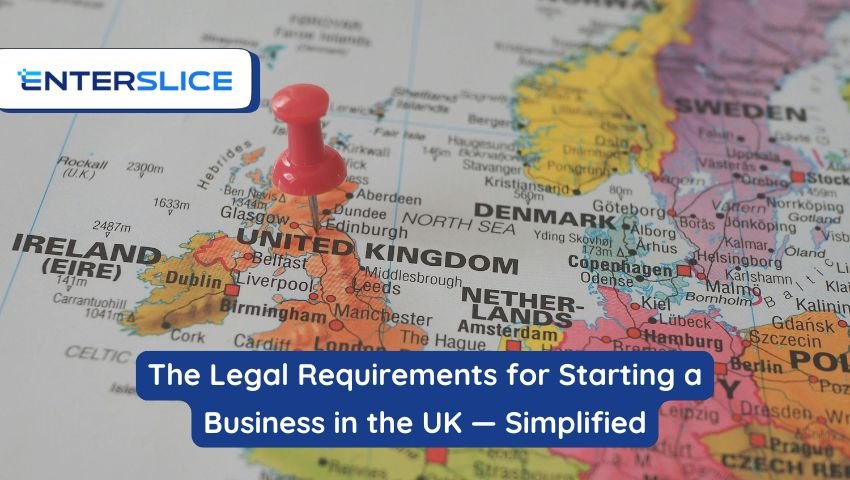Starting a business in the UK is an exciting step for any entrepreneur, whether you’re a resident or an overseas investor looking to establish a global presence. The UK is known for its business-friendly environment, transparent legal system, and straightforward incorporation process. But to ensure a smooth launch, it’s crucial to understand the legal requirements involved.
Whether you’re exploring company incorporation in the UK or researching how to set up your first business, this guide will walk you through what you need to know — clearly and practically.
1. Decide on Your Business Structure
Before jumping into forms and legal registrations, the first thing you’ll need to do is choose a business structure. This choice affects your legal responsibilities, tax obligations, and the amount of control you have.
In the UK, the most common business structures are:
-
Sole trader: Simple and quick to set up. You run the business as an individual and keep all profits, but you’re also personally liable for any debts.
-
Partnership: Two or more people run the business together and share profits, losses, and liabilities.
-
Limited company: A separate legal entity that offers liability protection. This is the most common route for entrepreneurs going through UK company incorporation.
For many international entrepreneurs, a limited company is the preferred structure because it helps establish credibility, protects personal assets, and provides access to more funding and tax planning options.
2. Choose and Register a Business Name
Once you’ve selected your structure, you’ll need a business name. If you’re registering a limited company, your name must be unique and not too similar to existing company names on the UK Companies House register.
Here are some quick tips:
-
Check name availability on the Companies House website.
-
Avoid using sensitive or offensive words unless you have proper permission.
-
Include “Limited” or “Ltd” at the end of your company name if forming a private limited company.
This step is essential during the process of UK company registration, as your company name becomes your brand identity.
3. Register With Companies House
If you’re forming a limited company, registering with Companies House is a key legal requirement. This is where the actual process of company incorporation in UK takes place.
You’ll need to provide the following:
-
Company name
-
Registered office address in the UK
-
Names of directors and shareholders
-
Statement of capital (explaining your company’s shares)
-
Memorandum and articles of association
This registration can be done online in most cases and usually takes less than 24 hours. Once registered, your company receives a unique Company Registration Number (CRN), which acts like an official ID.
If you’re going through a service provider, they’ll usually take care of this part of the UK company incorporation process for you.
4. Set Up a UK Business Bank Account
A UK-based business bank account is vital for separating your finances from business transactions. Most banks require:
-
Proof of company registration
-
Proof of identity and address for directors and shareholders
-
A UK business address
If you’re based outside the UK, this step might take more time and documentation, but it’s still achievable, especially if you’re working with an incorporation agent.
5. Register for Taxes
Every business in the UK must meet tax obligations, which vary depending on structure and turnover. After your company registration in the UK is complete, the next step is ensuring you’re tax-compliant.
Here’s what to consider:
-
Corporation Tax: If you’re running a limited company, you must register for Corporation Tax within three months of starting business activity.
-
VAT (Value Added Tax): If your turnover exceeds £90,000 in a 12-month period, you must register for VAT. You can also register voluntarily if it suits your business model.
-
PAYE (Pay As You Earn): If you hire employees, you’ll need to set up PAYE to handle their income tax and National Insurance contributions.
Keep detailed financial records from day one to avoid issues during tax filings.
6. Comply With Licenses and Permits
Depending on the type of business you run, you may need specific licenses or permits. Common examples include:
-
Food businesses (restaurants, cafes)
-
Import/export companies
-
Childcare services
-
Financial services
Each industry has its own regulatory body, so it’s wise to consult with a solicitor or business advisor to ensure you’re meeting all the legal obligations.
7. Understand Employment Laws
If you plan to hire employees, UK employment law is something you can’t afford to overlook. Here are some legal requirements:
-
Provide a written employment contract
-
Pay at least the National Minimum Wage
-
Register for PAYE with HMRC
-
Ensure safe and inclusive working conditions
-
Provide statutory benefits (such as holiday pay and sick leave)
You’ll also need to check employees’ right to work in the UK and conduct appropriate background checks where necessary.
8. Set Up Business Insurance
While not always legally required, business insurance can protect you from unexpected risks. Depending on your business type, you may need:
-
Employers’ liability insurance (required if you have staff)
-
Public liability insurance
-
Professional indemnity insurance
-
Product liability insurance
Choosing the right policy can protect you against lawsuits, damages, and even data breaches.
9. Maintain Ongoing Compliance
After your UK company registration is complete, you’re not off the hook. There are ongoing legal duties to maintain:
-
File annual confirmation statements to Companies House
-
Submit annual accounts and Corporation Tax returns
-
Keep accurate records of income, expenses, and employee details
-
Renew any business licenses or permits when required
Failing to meet these obligations can result in penalties or being struck off the register — something we definitely want to help you avoid.
Final Thoughts
Starting a business in the UK is relatively straightforward, but there’s a clear legal path you must follow to get up and running smoothly. From choosing the right structure to completing your UK company registration and staying compliant with taxes, laws, and regulations, each step plays a vital role in your company’s long-term success.
If you’re serious about setting up in the UK market, taking the time to get things right from day one will save you from costly headaches later. Whether you’re managing your own company incorporation in the UK or working with professionals, the right guidance will make the process smoother.
We’re here to help global entrepreneurs like you navigate these processes with clarity and confidence. The UK remains one of the most dynamic places to do business — and now, you’re ready to be a part of it.
Also Read: Different Types of Audits in Dubai
FAQs
1. Can a non-UK resident register a company in the UK?
Yes, non-UK residents can register a UK company. However, you must have a registered office address in the UK and may face more requirements when opening a UK bank account.
2. How long does UK company incorporation take?
If done online, the registration process typically takes 24 hours. Paper applications may take up to 10 working days.
3. Do I need a business plan to register a company in the UK?
A business plan isn’t legally required for company registration in the UK, but it’s highly recommended to clarify your vision, attract investors, and secure funding.
Also Read: Understanding Taxation in Dubai Trade Free Zones
Also Read: Accounting and Auditing Requirements for a Company Limited by Guarantee in Singapore













































